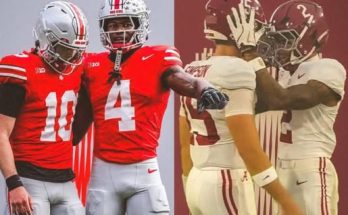Notre Dame’s 2025 football season has been a paradox wrapped in prestige, power, and perception. The Fighting Irish have long stood as one of college football’s crown jewels — a program steeped in history, backed by national appeal, and buoyed by a fan base that spans the country. Yet, as this season has unfolded, one glaring truth stands out: Notre Dame lacks a true marquee win. Despite that, the Irish are still positioned squarely in the heart of the College Football Playoff conversation, and barring a major stumble, they could very well find themselves among the final four teams. The situation raises a polarizing question — how can a team without a defining victory still control its playoff destiny?
At the surface level, Notre Dame’s record paints a flattering picture. They’ve won convincingly against the teams they were supposed to beat, avoided any catastrophic losses, and maintained the kind of national profile that voters and selection committees often reward. Their offense has been efficient if not explosive, their defense sturdy if not elite. Head coach Marcus Freeman has built a disciplined, well-coached team that rarely beats itself, and in the world of college football chaos, that’s often enough to stay relevant deep into November. But beneath that glossy record lies a resume that’s noticeably light on substance. The Irish’s best opponents have either stumbled themselves or fallen short of expectations, leaving Notre Dame’s wins looking increasingly hollow as the season has progressed.
For instance, early in the year, the Irish picked up a comfortable win over a then-ranked opponent that has since faded into mediocrity. Their other so-called “big games” have come against programs either rebuilding or grappling with inconsistency. The Irish have handled those opponents with professionalism — winning by multiple scores, executing cleanly, and looking the part of a playoff contender. But college football isn’t just about wins and losses; it’s about who you beat and how you beat them. And that’s where Notre Dame’s case becomes murky.
The College Football Playoff selection committee has long claimed to value strength of schedule and quality wins. Yet history shows that certain brands — Alabama, Ohio State, Georgia, and yes, Notre Dame — tend to benefit from the benefit of the doubt. That’s not necessarily a conspiracy; it’s simply the reality of how perception drives the sport. A one-loss Notre Dame, especially with its independent schedule and national following, often gets treated differently than a one-loss team from the Big 12 or Pac-12. The Irish don’t just bring wins; they bring television ratings, history, and intrigue. That makes them hard to ignore, even when their resume doesn’t quite measure up to other contenders.
But the heart of the debate isn’t about favoritism alone — it’s about what constitutes a “marquee win” in this new era of college football parity. The sport has changed dramatically in recent years. The transfer portal has leveled the playing field. NIL deals have reshaped rosters. Traditional powerhouses have been vulnerable, and supposed mid-tier programs have risen to prominence. In that environment, there are fewer truly dominant teams, and therefore, fewer opportunities for anyone — even Notre Dame — to claim a headline victory. The Irish have beaten good teams, perhaps even very good ones, but none that have yet established themselves as elite. And yet, in a season of chaos, “good” might be good enough.
Another factor working in Notre Dame’s favor is timing. The Irish have been relatively consistent, while many of their playoff rivals have stumbled at the wrong moments. Teams that once looked destined for the playoff have dropped games they couldn’t afford to lose. Others have struggled with injuries or internal turmoil. Meanwhile, Notre Dame has maintained composure, kept its path clean, and avoided the drama. In the committee’s eyes, that stability counts for something. A win may not have been over a top-five opponent, but it’s still a win — and when other contenders are tripping over themselves, steady excellence can look like greatness.
Critics, however, are not convinced. They argue that Notre Dame’s schedule design, while often labeled “tough” because of brand names, doesn’t always reflect true difficulty. Teams like USC, Stanford, and Navy once carried heavy reputations, but recent seasons have exposed those matchups as less daunting than they appear on paper. Even games against ranked opponents have lost their luster when those teams fall apart later in the year. The Irish benefit from the image of a challenging independent schedule without always facing the weekly grind of an SEC or Big Ten gauntlet. It’s a perception gap that frustrates many fans who see the Irish positioned ahead of more battle-tested conference teams.
Still, perception is reality in college football. Notre Dame’s brand carries immense weight, and their performance has been clean enough to justify their standing — at least statistically. Their quarterback play has been efficient, their running game dependable, and their defense has produced key stops in critical moments. Freeman’s leadership has brought an identity rooted in toughness and resilience, two traits the committee often values. The Irish may not have a signature win, but they’ve avoided any signature failures, and that steadiness resonates deeply in a season defined by unpredictability.
One could argue that Notre Dame’s “marquee” moment hasn’t arrived yet — but might still be coming. The closing stretch of their schedule could offer opportunities to make a statement, whether through dominant performances or victories over resurgent teams. The committee has shown in the past that late-season impressions can outweigh early-season narratives. A strong finish, coupled with chaos elsewhere, could all but secure Notre Dame’s playoff bid, marquee win or not. The Irish have mastered the art of timing, often peaking when others falter. That, more than any single result, could define their campaign.
Another layer to this debate involves the larger playoff structure itself. With expansion looming, the urgency of defining “marquee wins” may soon fade, as more teams gain access to the postseason. But in the current four-team format, every spot is precious, and every resume is scrutinized. The fact that Notre Dame remains in prime position despite lacking a defining victory speaks volumes about how the system truly operates. The Irish’s national appeal, consistent execution, and absence of blemishes give them a unique kind of strength — not the loud, explosive kind born from headline victories, but the quiet, enduring strength of reliability.
There’s also a philosophical question at play: what do we really mean by a “marquee win”? Is it about beating a top-10 opponent, or is it about performing like a top-10 team every week? Notre Dame has arguably done the latter. They’ve shown up every Saturday, imposed their will, and handled business with professional focus. In many ways, that’s what elite teams do. Not every year offers opportunities to knock off giants; sometimes, dominance is measured by consistency rather than heroics. The Irish may not have a single defining triumph, but their cumulative body of work tells a story of sustained excellence — and perhaps that’s enough.
For longtime observers, this moment feels familiar. Notre Dame has often found itself walking this tightrope between merit and mythology. In 2018 and 2020, similar debates raged over whether the Irish truly belonged in the playoff field. Both times, they earned their spot, only to face the harsh reality of playoff competition against teams built with deeper speed and talent. Those past experiences have shaped the national skepticism surrounding the Irish. Fans and analysts alike wonder if history will repeat itself — if Notre Dame will once again glide into the playoff on reputation and consistency, only to meet the ceiling of elite-level competition. But for Freeman and his players, those doubts are just noise. The Irish believe they’ve evolved, that they’re tougher, faster, and more balanced than those previous iterations.
Regardless of how the debate ends, Notre Dame’s position underscores the enduring power of college football’s biggest brands. The Irish might not have a “wow” moment on their resume, but they have something perhaps more valuable — relevance. In an era when media narratives, television exposure, and legacy still shape playoff discussions, Notre Dame’s ability to remain front and center is a testament to their enduring allure. The gold helmets still shine brightest under the national spotlight, and that counts for something, whether fans admit it or not.
In the end, Notre Dame’s playoff case may not hinge on a single signature win but on the totality of their performance and the chaos surrounding them. They’ve handled every challenge in front of them, maintained discipline, and avoided the pitfalls that have undone others. Maybe that’s not glamorous, but it’s effective. The Irish don’t need a dramatic upset to validate their season — they just need to keep winning. The playoff committee has shown time and again that style points fade, but victories endure. Notre Dame’s campaign may lack a defining highlight, but it possesses something just as important: control of their destiny.
If the Irish do reach the playoff, debates will rage about whether they earned it through true greatness or institutional bias. But perhaps the truth lies somewhere in between. Notre Dame has built a season on competence, consistency, and quiet authority. They’ve done enough to stay undefeated or near-perfect in a sport where perfection is rare. And in a year without dominant teams, that steadiness might be the closest thing to greatness anyone can find. Whether fair or not, the Irish once again stand at the threshold of opportunity, proof that in college football, perception, history, and execution still weave together to shape destiny.



